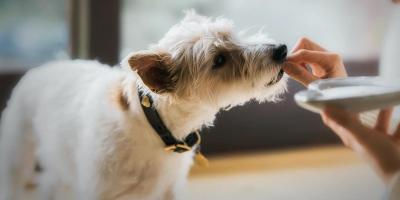
Just like human babies, puppies use their mouths to explore the world through the items they encounter. This means everything goes into their mouth – like human hands, feet, fingers and toes. Biting or nipping is normal behaviour for your puppy, but it is important for you to know how to train a puppy to not bite and teach him early on, or you’re in for bigger ouches later.
Why do puppies bite?
Most times, biting occurs when your puppy wants to play with you. Puppies learn to play with their littermates, which involves rough-and-tumble play with lots of biting. Puppies can often tolerate this rough play, as they have thick skins and tend to give as good as they get. As they gain strength, the biting starts to hurt, and they may squeal when a littermate gets too rough. This helps the biting puppy back off. Even the puppies’ mother will tell them off when they nip at her. When your puppy enters your home it is your turn to teach them their boundaries.
Is rough-housing ever okay?
Rough-housing refers to playing in an energetic and very physical manner with your puppy. Some owners enjoy playing this way, however, this can become a lot less fun as his adult teeth come in. This can also be a dangerous form of play for people with delicate skin, like seniors or young children. Additionally, it may be difficult for your puppy to calm down, even when playtime is over.
How to teach a puppy not to bite
If you’ve ever received a bite from a puppy, you’ll know that it can hurt quite a bit. Of course, your puppy doesn’t intentionally want to hurt you. Typically, it happens when he gets a little too excited during playtime. To help keep playtime with your puppy safe and fun, follow these handy tips:
Toys, toys and more toys
There’s nothing wrong with playing energetically with your puppy and him using his teeth, but he should be directing this energy onto appropriate objects. You should play with your puppy in a manner that’s less likely to hurt, right from the beginning. Have a variety of sturdy toys on hand when starting a play session. If your puppy goes to use his teeth, place a toy in his mouth. For a list of games to play with your puppy, check out our article on how to play with your puppy.
Say no
Take time to teach your puppy the “no” command. If your puppy is starting to get nippy while playing, stand up, take your hands away and firmly say “no.” Give him a treat when he is sitting calmly as a reward for the desired behaviour.
Let out a yelp
Another effective method is to react like another dog might if he was bitten and let out a high-pitched yelp when your puppy uses his teeth. You can do this even if the bite is not painful. This squeal will make your puppy back off for a few seconds and allow you to withdraw. It’s important that after you yelp, you don’t engage with your puppy further and that playtime ends, at least for a short while. When you start to play again, have toys handy to place in your puppy’s mouth.
Teach your puppy to “leave it”
Teaching your puppy a command like “leave it” can be useful and prevents him from mouthing or eating items that are inappropriate. When first teaching this command, do it outside of a play session. When he’s more comfortable with the command, you can use it during play. Reward your puppy when he obeys.
Never punish
If you punish your dog, this will give them attention and likely encourage them to continue the behaviour. It’s also likely to reduce the bond between you and your dog. Dogs that are punished, both physically and verbally, are more likely to retaliate with aggression. Make sure you don’t yell at your puppy, tap him on the nose, or hold his mouth shut when he bites.
Praise him
When your puppy plays gently with you, remember to praise him. The praise will encourage him to play in a manner where everyone has fun.
Train your puppy to play gently
Take time to train your puppy to use his mouth gently. Wave a closed fist in front of his face and pull it away if he tries to nip. Try it again, and if he does not nip at you, reward him with a treat. Make sure the treat is in the opposite hand that you are presenting.
Try this with other objects, your open hand, your finger and finally a toy, eventually giving him the toy before he nips. As you continue training, lengthen the time he has to wait before giving the treat or toy to play with. Read our article on how to train your puppy for more puppy training tips.
What if my puppy still bites?
Since puppies use their mouths to explore the world, have fun or get your attention, it is inevitable that they will use their teeth on you at least once or twice. Be patient and continue to train your puppy to play with you in an appropriate way. If all else fails, and your puppy continues to be too rough, seek professional help. If your puppy is older, or if you have an adult dog that continues to bite, they may need to have their teeth and mouths examined.
Related articles



